人教版选修八第四单元 Pygmalion 第二篇课文逐段分析 16张PPT
文档属性
| 名称 | 人教版选修八第四单元 Pygmalion 第二篇课文逐段分析 16张PPT | 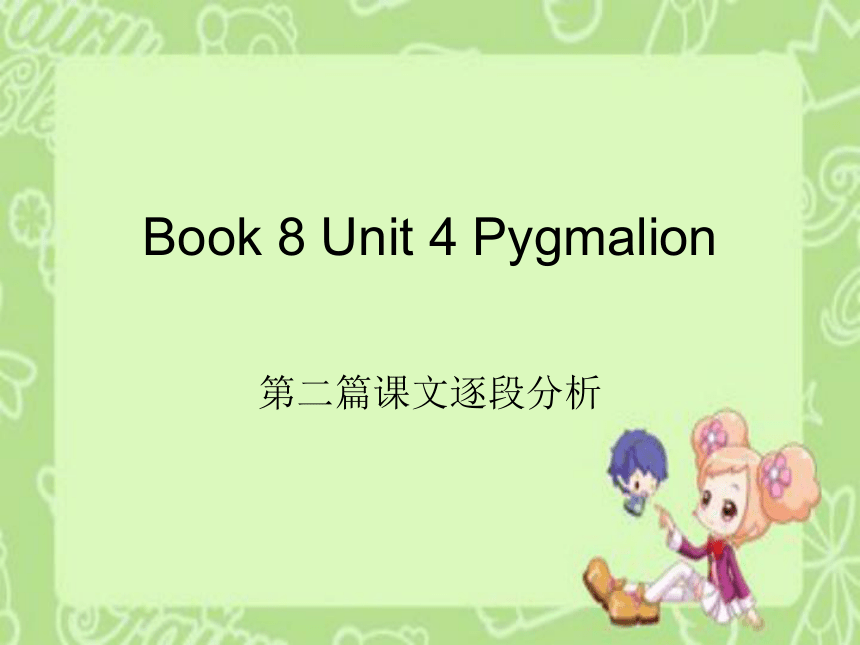 | |
| 格式 | zip | ||
| 文件大小 | 3.1MB | ||
| 资源类型 | 教案 | ||
| 版本资源 | 人教版(新课程标准) | ||
| 科目 | 英语 | ||
| 更新时间 | 2020-05-20 07:43:10 | ||
图片预览

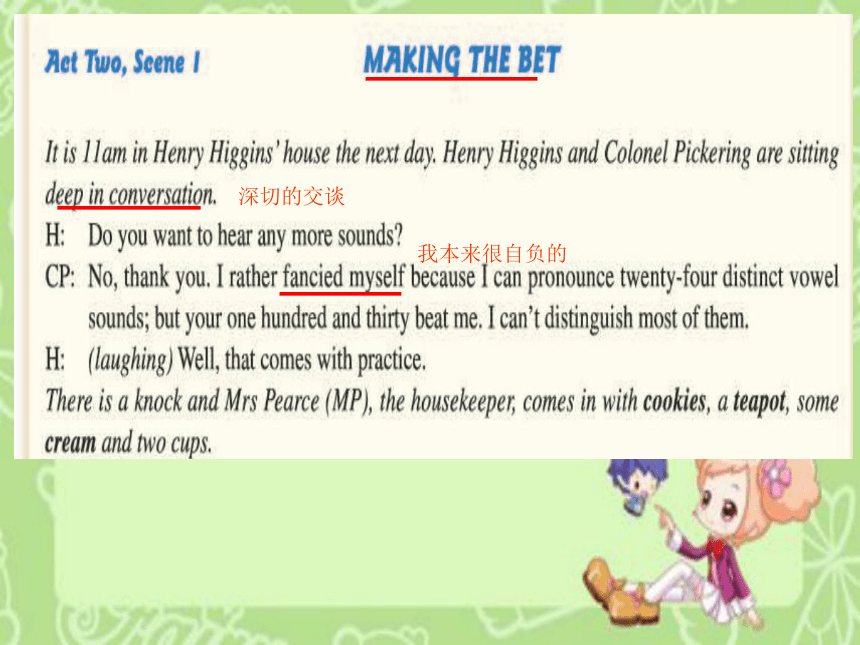
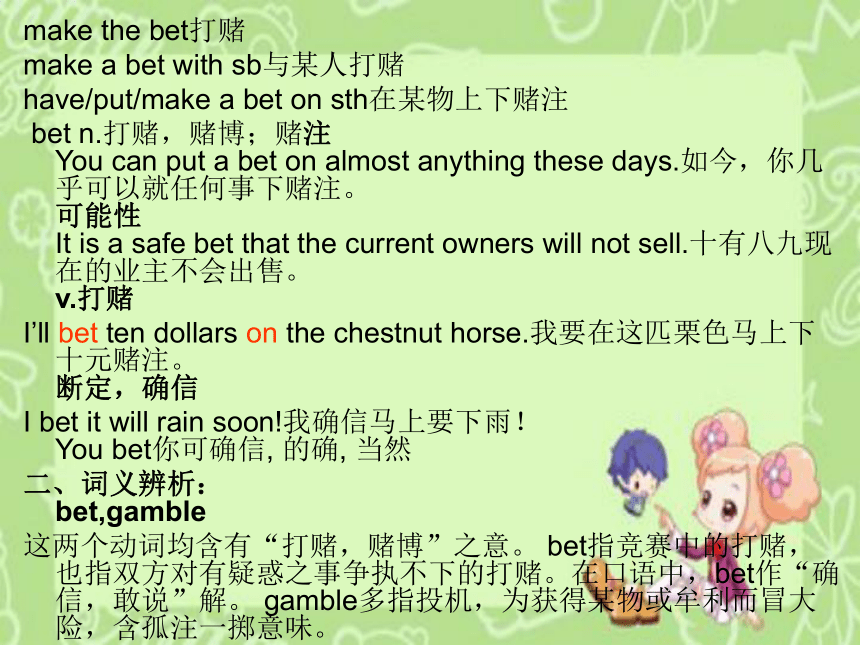
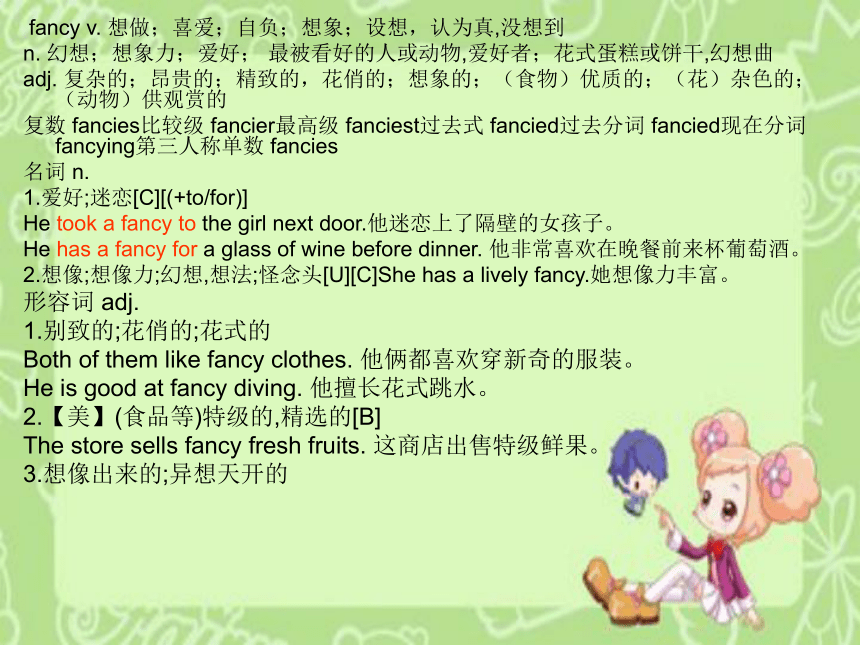
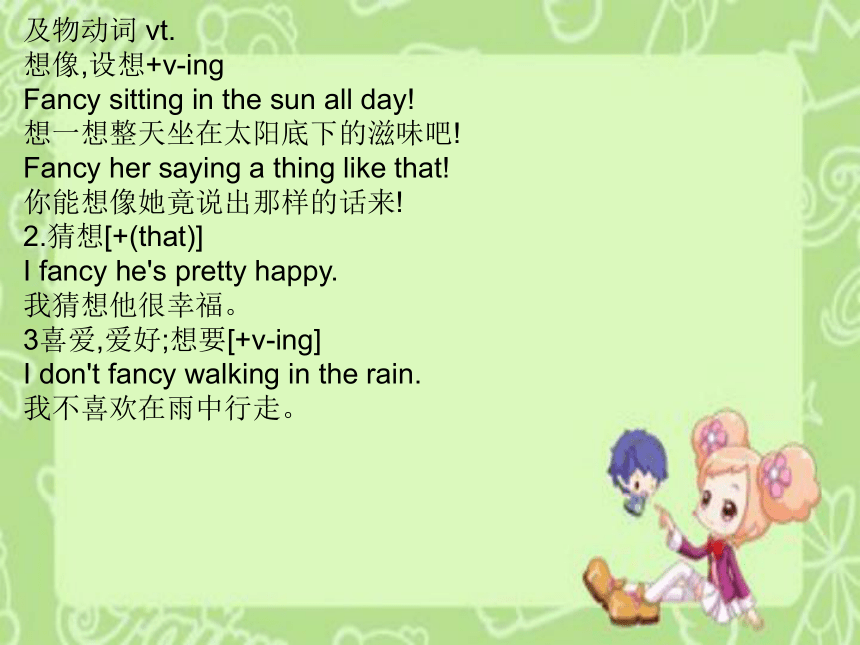
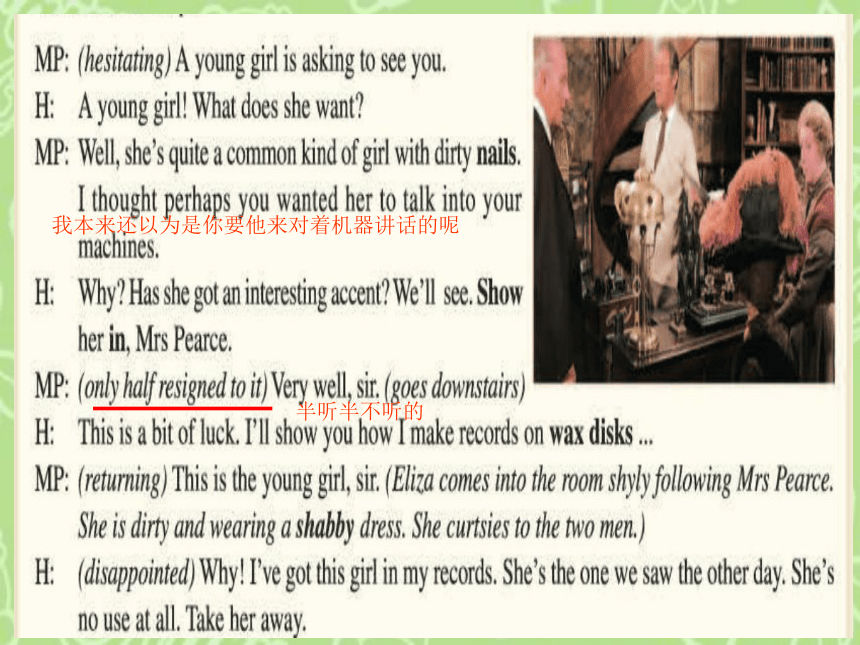
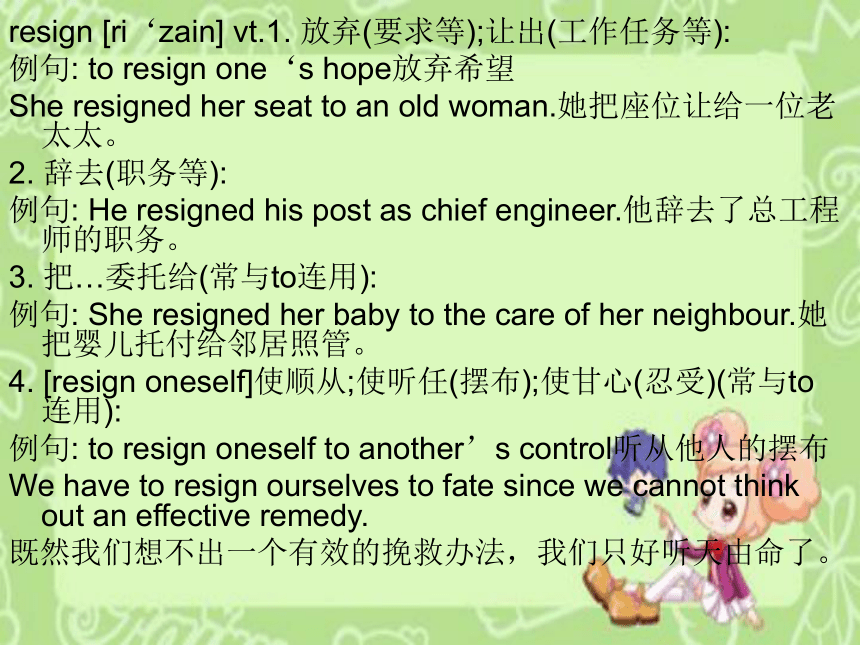
文档简介
(共31张PPT)
Book 8 Unit 4 Pygmalion
第二篇课文逐段分析
我本来很自负的
深切的交谈
make the bet打赌
make a bet with sb与某人打赌
have/put/make a bet on sth在某物上下赌注
bet n.打赌,赌博;赌注 You can put a bet on almost anything these days.如今,你几乎可以就任何事下赌注。 可能性 It is a safe bet that the current owners will not sell.十有八九现在的业主不会出售。 v.打赌
I’ll bet ten dollars on the chestnut horse.我要在这匹栗色马上下十元赌注。 断定,确信
I bet it will rain soon!我确信马上要下雨! You bet你可确信, 的确, 当然
二、词义辨析: bet,gamble
这两个动词均含有“打赌,赌博”之意。 bet指竞赛中的打赌,也指双方对有疑惑之事争执不下的打赌。在口语中,bet作“确信,敢说”解。 gamble多指投机,为获得某物或牟利而冒大险,含孤注一掷意味。
fancy v. 想做;喜爱;自负;想象;设想,认为真,没想到
n. 幻想;想象力;爱好; 最被看好的人或动物,爱好者;花式蛋糕或饼干,幻想曲
adj. 复杂的;昂贵的;精致的,花俏的;想象的;(食物)优质的;(花)杂色的;(动物)供观赏的
复数 fancies比较级 fancier最高级 fanciest过去式 fancied过去分词 fancied现在分词 fancying第三人称单数 fancies
名词 n.
1.爱好;迷恋[C][(+to/for)]
He took a fancy to the girl next door.他迷恋上了隔壁的女孩子。
He has a fancy for a glass of wine before dinner. 他非常喜欢在晚餐前来杯葡萄酒。
2.想像;想像力;幻想,想法;怪念头[U][C]She has a lively fancy.她想像力丰富。
形容词 adj.
1.别致的;花俏的;花式的
Both of them like fancy clothes. 他俩都喜欢穿新奇的服装。
He is good at fancy diving. 他擅长花式跳水。
2.【美】(食品等)特级的,精选的[B]
The store sells fancy fresh fruits. 这商店出售特级鲜果。
3.想像出来的;异想天开的
及物动词 vt.
想像,设想+v-ing
Fancy sitting in the sun all day!
想一想整天坐在太阳底下的滋味吧!
Fancy her saying a thing like that!
你能想像她竟说出那样的话来!
2.猜想[+(that)]
I fancy he's pretty happy.
我猜想他很幸福。
3喜爱,爱好;想要[+v-ing]
I don't fancy walking in the rain.
我不喜欢在雨中行走。
我本来还以为是你要他来对着机器讲话的呢
半听半不听的
resign [ri‘zain] vt.1. 放弃(要求等);让出(工作任务等):
例句: to resign one‘s hope放弃希望
She resigned her seat to an old woman.她把座位让给一位老太太。
2. 辞去(职务等):
例句: He resigned his post as chief engineer.他辞去了总工程师的职务。
3. 把…委托给(常与to连用):
例句: She resigned her baby to the care of her neighbour.她把婴儿托付给邻居照管。
4. [resign oneself]使顺从;使听任(摆布);使甘心(忍受)(常与to连用):
例句: to resign oneself to another’s control听从他人的摆布
We have to resign ourselves to fate since we cannot think out an effective remedy.
既然我们想不出一个有效的挽救办法,我们只好听天由命了。
vi.1. 辞职;退出(常与from连用):
例句: The three other teachers had resigned as well.其他三位教师也都辞职了。
Many members resigned from the club.很多会员退出了俱乐部。
2. 听任;顺从(常与to连用):例句: to resign to one‘s fate听天由命
想要
而不是
除非
她真是粗俗的可爱
Now you are talking.
wanna vt. 要(做), 想(做), 想要(某物)=want to
wanna是一个非正式的口语化的词。他的意思是:想要,有意愿的。和want to的用法相同。相比于want to更广泛应用与日常对话。
起源:这个词起源于美国的日常用语;而拼写方式则起源于网络聊天室。目的是便于发音,以及打字方便。 其实就和我们很多的网络用语一样,比如我们说"没有"是"木有"。
1. I?wanna?go.
我想走了。
2. Hello, this is John. I?wanna?speak to Linda, please.
你好,我是约翰。我想和琳达说话。
3. They don't?wanna?do it.
他们不想那么做。
同类型的词语:gonna=going to, gotta = got to,hafta =have to (必须)
coulda =could have(本来可能), shoulda = should have (本来应该) woulda =would have本来可以, musta =must have/ya( 一定是),sorta = sort of = Kind of,(一点点)复数为sortsa?,ya(you的口语读法。 )
’stead o’= in stead of而不是
’less=unless除非
yer=you are
pass sb off as……把某人冒充成……
deliciously low粗俗的可爱,low指粗俗,低俗
我不敢
dursn’t= dare not
翻译为“不敢”
I dursn’t?do it.
我不敢做那件事。
把她扔回去
两人一道朝台下走去,声音逐渐减弱
go off the stage 下台
1.(指演员)退场, 下场;
2.开火,爆炸;
3.突然发出巨响,发出声音;
4(指电力)中断,(指电灯等)熄灭;
5.变得不适於食用或饮用,变坏;质量变坏,恶化;
6.以某种方式进行或发生
7.入睡
The alarm went off. 警铃骤然响起。 This milk has gone off. 牛奶变坏了。 Hasn't the baby gone off yet? 婴孩还没入睡吗? The plan went off well. 计划进行得很顺利。
Book 8 Unit 4 Pygmalion
第二篇课文逐段分析
我本来很自负的
深切的交谈
make the bet打赌
make a bet with sb与某人打赌
have/put/make a bet on sth在某物上下赌注
bet n.打赌,赌博;赌注 You can put a bet on almost anything these days.如今,你几乎可以就任何事下赌注。 可能性 It is a safe bet that the current owners will not sell.十有八九现在的业主不会出售。 v.打赌
I’ll bet ten dollars on the chestnut horse.我要在这匹栗色马上下十元赌注。 断定,确信
I bet it will rain soon!我确信马上要下雨! You bet你可确信, 的确, 当然
二、词义辨析: bet,gamble
这两个动词均含有“打赌,赌博”之意。 bet指竞赛中的打赌,也指双方对有疑惑之事争执不下的打赌。在口语中,bet作“确信,敢说”解。 gamble多指投机,为获得某物或牟利而冒大险,含孤注一掷意味。
fancy v. 想做;喜爱;自负;想象;设想,认为真,没想到
n. 幻想;想象力;爱好; 最被看好的人或动物,爱好者;花式蛋糕或饼干,幻想曲
adj. 复杂的;昂贵的;精致的,花俏的;想象的;(食物)优质的;(花)杂色的;(动物)供观赏的
复数 fancies比较级 fancier最高级 fanciest过去式 fancied过去分词 fancied现在分词 fancying第三人称单数 fancies
名词 n.
1.爱好;迷恋[C][(+to/for)]
He took a fancy to the girl next door.他迷恋上了隔壁的女孩子。
He has a fancy for a glass of wine before dinner. 他非常喜欢在晚餐前来杯葡萄酒。
2.想像;想像力;幻想,想法;怪念头[U][C]She has a lively fancy.她想像力丰富。
形容词 adj.
1.别致的;花俏的;花式的
Both of them like fancy clothes. 他俩都喜欢穿新奇的服装。
He is good at fancy diving. 他擅长花式跳水。
2.【美】(食品等)特级的,精选的[B]
The store sells fancy fresh fruits. 这商店出售特级鲜果。
3.想像出来的;异想天开的
及物动词 vt.
想像,设想+v-ing
Fancy sitting in the sun all day!
想一想整天坐在太阳底下的滋味吧!
Fancy her saying a thing like that!
你能想像她竟说出那样的话来!
2.猜想[+(that)]
I fancy he's pretty happy.
我猜想他很幸福。
3喜爱,爱好;想要[+v-ing]
I don't fancy walking in the rain.
我不喜欢在雨中行走。
我本来还以为是你要他来对着机器讲话的呢
半听半不听的
resign [ri‘zain] vt.1. 放弃(要求等);让出(工作任务等):
例句: to resign one‘s hope放弃希望
She resigned her seat to an old woman.她把座位让给一位老太太。
2. 辞去(职务等):
例句: He resigned his post as chief engineer.他辞去了总工程师的职务。
3. 把…委托给(常与to连用):
例句: She resigned her baby to the care of her neighbour.她把婴儿托付给邻居照管。
4. [resign oneself]使顺从;使听任(摆布);使甘心(忍受)(常与to连用):
例句: to resign oneself to another’s control听从他人的摆布
We have to resign ourselves to fate since we cannot think out an effective remedy.
既然我们想不出一个有效的挽救办法,我们只好听天由命了。
vi.1. 辞职;退出(常与from连用):
例句: The three other teachers had resigned as well.其他三位教师也都辞职了。
Many members resigned from the club.很多会员退出了俱乐部。
2. 听任;顺从(常与to连用):例句: to resign to one‘s fate听天由命
想要
而不是
除非
她真是粗俗的可爱
Now you are talking.
wanna vt. 要(做), 想(做), 想要(某物)=want to
wanna是一个非正式的口语化的词。他的意思是:想要,有意愿的。和want to的用法相同。相比于want to更广泛应用与日常对话。
起源:这个词起源于美国的日常用语;而拼写方式则起源于网络聊天室。目的是便于发音,以及打字方便。 其实就和我们很多的网络用语一样,比如我们说"没有"是"木有"。
1. I?wanna?go.
我想走了。
2. Hello, this is John. I?wanna?speak to Linda, please.
你好,我是约翰。我想和琳达说话。
3. They don't?wanna?do it.
他们不想那么做。
同类型的词语:gonna=going to, gotta = got to,hafta =have to (必须)
coulda =could have(本来可能), shoulda = should have (本来应该) woulda =would have本来可以, musta =must have/ya( 一定是),sorta = sort of = Kind of,(一点点)复数为sortsa?,ya(you的口语读法。 )
’stead o’= in stead of而不是
’less=unless除非
yer=you are
pass sb off as……把某人冒充成……
deliciously low粗俗的可爱,low指粗俗,低俗
我不敢
dursn’t= dare not
翻译为“不敢”
I dursn’t?do it.
我不敢做那件事。
把她扔回去
两人一道朝台下走去,声音逐渐减弱
go off the stage 下台
1.(指演员)退场, 下场;
2.开火,爆炸;
3.突然发出巨响,发出声音;
4(指电力)中断,(指电灯等)熄灭;
5.变得不适於食用或饮用,变坏;质量变坏,恶化;
6.以某种方式进行或发生
7.入睡
The alarm went off. 警铃骤然响起。 This milk has gone off. 牛奶变坏了。 Hasn't the baby gone off yet? 婴孩还没入睡吗? The plan went off well. 计划进行得很顺利。
